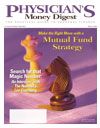Confront the Malevolence of Accrued Debt
Our society seems to believe we can borrowourselves into prosperity. History showsthat to be a fallacy. Paul Volcker, formerChairman of the Federal Reserve, was recently quotedas saying he thought there was a 75% chance theUnited States would experience a third-world-styledebt crisis within the next 5 years.
Mired in Debt
Everything is driven by basic forces. The moreinsight and understanding you can gain into thesebasic forces, the easier it is to comprehend the concept.The fact that money must be borrowed indicatesthat the purchase cannot be afforded in the firstplace. We would make significantly less mistakes ifwe were required to pay cash for all purchases orinvestments. In my opinion, borrowers should havetheir hands slapped for so many trips to the cookiejar and banks should be spanked for indulging them.The United States used to be the richest country onearth. Now we sadly lay claim to the title of theworld's greatest debtor.
We live in homes larger than we need, that we cannotafford, and that are financed with mortgages thatcan only be characterized as obscene. I believe youcannot afford a home if you do not have a 20%down payment. Purchasing a home with little or nodown payment with an interest-only or negativeamortization loan is financial insanity. Both the borrowerand the lender are taking a terrible risk. Homeequity loans are equally as irresponsible. Your goalshould be to pay off your home as early as possible,not use it as a piggy bank for unneeded personal consumption.I suggest a fixed-rate note with a 10-to15-year amortization. Everyone should plan to owntheir home free and clear by age 45.
Amounts of Debt
What is an appropriate amount of debt? Lendinginstitutions use a variety of formulas relating amountof debt to income or net worth. I view these with significantcaution as they define the maximum amountof debt, which is far too high. I suggest these guidelinesbe reduced by at least half. My final recommendationis simple: The less debt, the better.
I have a friend who is on a local bank board.Their general loan guidelines are:
1) If you have a steady job, such as a teacher, theywill give you a mortgage up to $150,000.
2) If you are a physician, you can borrow almostas much as you wish. Imagine, all that is required toborrow almost any amount of money is an MDdegree, enough breath to fog a mirror, and an abilityto sign your name on the dotted line.
For those of you who are science fiction fans, debtis the financial equivalent of the dark side of theforce. Do not be seduced into inappropriate amountsof debt. If you pledge to yourself that you will neverborrow for anything except a reasonably financed,modest home and your education, you should neverhave significant problems with debt.
Robert M. Doroghazi, MD, FACC, graduated from the University of
Chicago, Ptizker School of Medicine, and completed his medical
internship and residency at the Massachusetts General Hospital.
He retired last year after 23 years of practice with the Missouri
Cardiovascular Specialists in Columbia, Mo. He authored The
Physician's Guide to Investing, A Practical Approach to Building Wealth (Humana
Press; 2005). This book can be purchased at www.humanapress.com. Many of
the themes for this article are taken from the work of James Turk, who writes for
the Freemarket Gold & Money Report.
